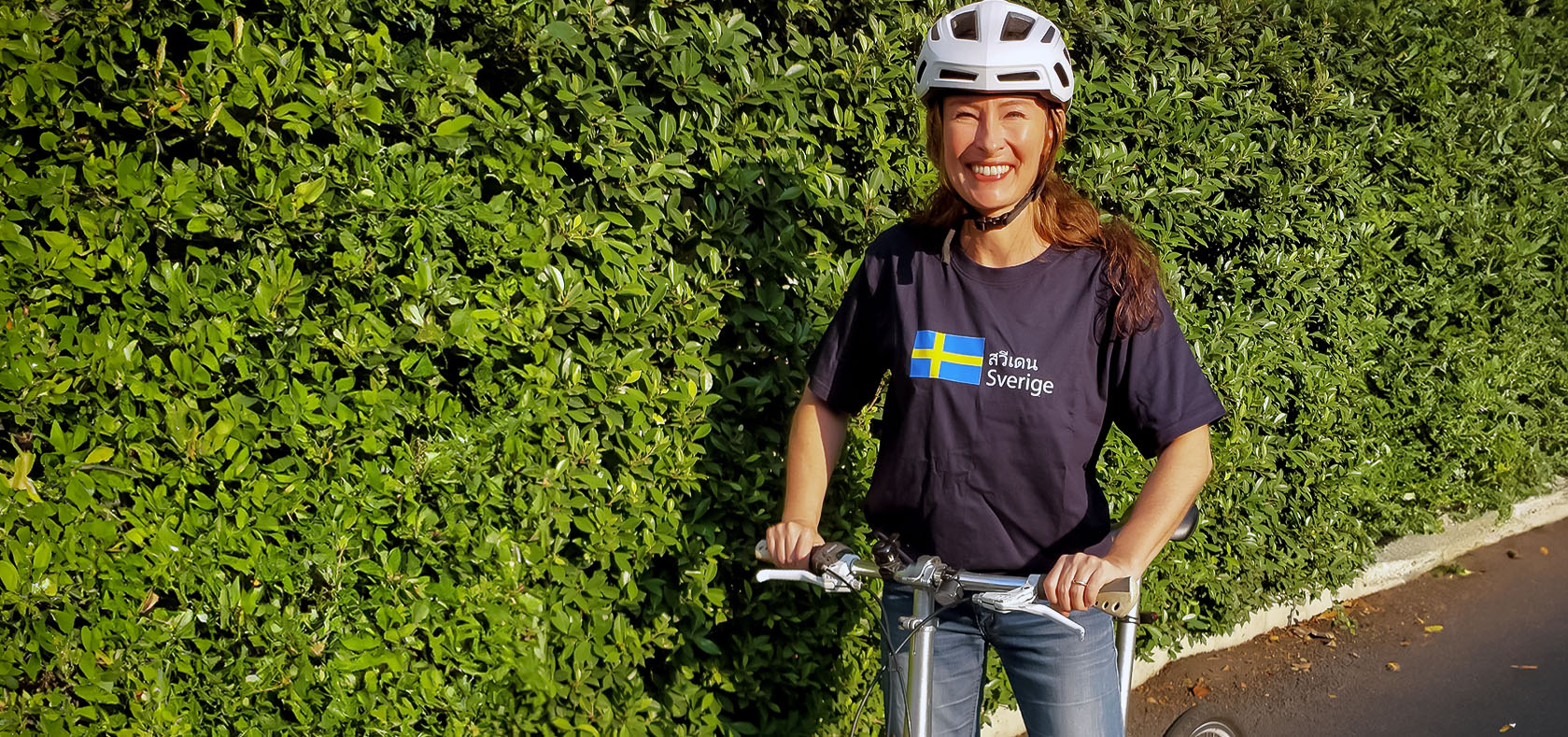"Climate change is the defining issue of our time”
Date:

Here is globalization at its finest: an Embassy official, assigned to the crowded concrete jungle of Bangkok, remains true to the rhythms of nature and the passion for preservation inspired by her childhood in a Swedish country village.
“Climate change,” Tove Goldmann proclaims, “is the defining issue of our times.”
In August, she will complete three fruitful years as a First Secretary at the Swedish Embassy in Thailand, officially Senior Program Manager, Environment and Climate Change. As such, she has been a key liaison in Sweden’s support for Phase Two of the EmPower: Women for Climate-Resilient Societies Programme, jointly implemented by UN Women and the UN Environment Programme (UNEP).
“The best moments,” Secretary Goldmann summarizes as her work comes to an end, “have of course been when we have visited communities where you can directly see the difference EmPower has made for women – in terms of empowerment, voice, access to finance and renewable energy, increased income, etc. Hearing the women themselves telling the stories of how their lives have changed is so inspiring!”
Initiated in 2018, the EmPower programme has proved of critical importance in the Asia-Pacific region that has the fastest-rising temperatures, is most prone to climate-related disasters and where 6 of the 10 world’s most-impacted countries are located. Phase One brought about a number of policy changes promoting gender equality, aided more than 50 women’s organizations, brought climate-resilient livelihoods and benefits of new investment and awareness to more than 2,000 women. Phase Two will build on these accomplishments, expanding to the Philippines and Indonesia, with support not only from Sweden but also from the governments of Germany, New Zealand and Switzerland.
“I believe the discussions with UN Women and UNEP started back in 2017,” Secretary Goldmann recounts. “As the Swedish strategy for regional development cooperation in Asia and the Pacific has a strong emphasis on an integrated approach the two organizations were “pushed” to develop a joint project and EmPower was born. Luckily that worked so well that now in Phase Two it is almost impossible to distinguish which organization a specific EmPower staff member belongs to. . . UN Women now working more on climate change and UNEP more on gender, within their respective mandates.”
Secretary Goldmann’s own expertise has been a lifetime in the making. As a teenager, she was inspired by the landmark UN Conference on the Environment and Development in Rio de Janeiro. This led her to obtaining degrees in Biology and Human Ecology, and thesis research on mangrove ecosystems in Sri Lanka and India. One of her first jobs was organizing a youth climate campaign leading up to COP6 in The Hague in 2000 and one of her prior assignments with the Swedish Ministry of Foreign Affairs was a seat on the Adaptation Fund and Green Climate Fund Boards.
However, her stint in the Asia-Pacific region and work with EmPower has underlined just how many other causes and constituencies are interlinked with the climate fight. She now views “norms and structures that hinder women from… fulfilling their potential as change agents” as the “key challenge.” As the Secretary rues, “So much great knowledge, ideas and solutions remain unheard, unknown, and untapped” By the same token, she has been able to witness how “proactive, innovative and smart climate action can also lead to greater gender equality. There is such a potential for great win-win action!”
A hint of her future plans can be heard in Secretary Goldmann’s declaration that “Gender and climate have been Swedish priority issues for a long time and will continue to be in focus for years to come. There is of course still a lot of work to be done. Working in an integrated approach – which EmPower illustrates so well – may seem a bit challenging as different thematic and operational spheres have different ways of thinking, different lingo, etc. But when it falls into place it is so powerful to see the effects of working together towards common goals.”
For Secretary Goldmann, this commitment extends far beyond working hours. “Well, I do my best as a citizen, as a fellow woman, and as a consumer. I try to talk to colleagues, friends, and family about (the) environment and climate issues. I try to eat climate friendly food.” That’s helped by being a committed vegetarian who counts Thai cuisine as one of her favorites. She also tries “to limit my consumption as much as possible . . . buy second hand clothes and says no to single use plastics. I ride my bicycle to work every day.” She even has ambitious plans to limit the carbon footprint of her return to Sweden by attempting to travel by train.
Tove Goldmann’s parting words harken back to the Nordic woods of her idyllic Swedish upbringing, urging actors in the Asia-Pacific region to “Link up with other women (and men) out there working in climate action. Be patient and keep going. Do not forget to take care of yourself as well – to me being in nature is a great way to relax, recharge and boost my motivation!”